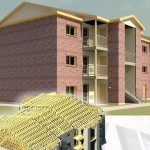 In the ever-evolving landscape of global development, sustainability has become a cornerstone for progress. Civil engineering, as a pivotal discipline, plays a crucial role in shaping a sustainable future. This blog aims to delve into the multifaceted ways civil engineering contributes to sustainable development, emphasizing the importance of responsible practices in the built environment. As we explore the various aspects of this vital partnership, we will also highlight the commitment of McNeil Engineering in providing comprehensive design services that align with the principles of sustainability.
In the ever-evolving landscape of global development, sustainability has become a cornerstone for progress. Civil engineering, as a pivotal discipline, plays a crucial role in shaping a sustainable future. This blog aims to delve into the multifaceted ways civil engineering contributes to sustainable development, emphasizing the importance of responsible practices in the built environment. As we explore the various aspects of this vital partnership, we will also highlight the commitment of McNeil Engineering in providing comprehensive design services that align with the principles of sustainability.1. Infrastructure development:
Civil engineering is the backbone of infrastructure development, encompassing roads, bridges, water supply systems, and more. Sustainable infrastructure design focuses on minimizing environmental impact, optimizing resource use, and promoting resilience. McNeil Engineering’s commitment to comprehensive design services aligns with these principles, ensuring that the infrastructure projects they undertake contribute to the long-term sustainability of communities.
2. Environmental impact assessment:
Before embarking on any project, civil engineers conduct thorough environmental impact assessments. This involves evaluating the potential effects of a project on the surrounding ecosystem. McNeil Engineering’s dedication to responsible practices includes conducting meticulous assessments and ensuring that their designs not only meet regulatory requirements but also contribute to environmental conservation.
3. Water resource management:
Efficient water resource management is a key aspect of sustainable development. Civil engineers design water supply and distribution systems that prioritize conservation, reducing water wastage, and ensuring equitable access. McNeil Engineering’s expertise in civil engineering includes water resource management, ensuring sustainable solutions that address the challenges posed by growing urbanization and changing climatic conditions.
4. Waste management and recycling:
Civil engineers play a crucial role in designing waste management systems that prioritize recycling and waste reduction. Sustainable waste management practices, such as designing efficient landfills and promoting recycling infrastructure, are integral to minimizing the environmental footprint. McNeil Engineering’s comprehensive services extend to waste management solutions that align with sustainable practices, fostering a circular economy.
5. Green building design:
The construction industry has witnessed a shift towards green building design, emphasizing energy efficiency and reduced environmental impact. Civil engineers are instrumental in incorporating sustainable materials and design principles to create environmentally friendly structures. McNeil Engineering’s commitment to economical design solutions includes green building practices, contributing to the creation of sustainable and energy-efficient structures.
6. Urban planning and smart cities:
Civil engineers contribute significantly to urban planning, envisioning and designing smart cities that are sustainable, resilient, and technologically advanced. Integrating smart infrastructure, renewable energy solutions, and efficient transportation systems are vital aspects of creating cities that prioritize sustainability. McNeil Engineering’s comprehensive design services extend to urban planning, aligning with the vision of creating smarter and more sustainable urban environments.
7. Climate resilience:
As climate change poses increasing challenges, civil engineers are at the forefront of designing infrastructure that is resilient to extreme weather events. From flood-resistant structures to climate-adaptive designs, the role of civil engineering in ensuring the resilience of communities cannot be overstated. McNeil Engineering’s commitment to delivering responsive design solutions includes addressing climate resilience, and ensuring that the infrastructure they design stands the test of time.
8. Transportation planning and alternative mobility:
Civil engineers play a pivotal role in designing transportation systems that prioritize sustainability. From incorporating alternative modes of transport to optimizing traffic flow, sustainable transportation planning is essential for reducing carbon emissions. McNeil Engineering’s comprehensive services extend to transportation planning, contributing to the development of sustainable and efficient mobility solutions.
9. Brownfield redevelopment:
The redevelopment of brownfield sites, previously used for industrial purposes, requires careful planning to mitigate environmental risks. Civil engineers contribute by designing remediation strategies that revitalize these areas while ensuring environmental sustainability. McNeil Engineering’s commitment to responsible design extends to brownfield redevelopment, contributing to the transformation of disused sites into vibrant and sustainable spaces.
10. Community engagement and social sustainability:
Sustainable development is not solely about environmental considerations; it also encompasses social sustainability. Civil engineers engage with communities to understand their needs, ensuring that development projects align with the aspirations and well-being of the residents. McNeil Engineering’s commitment to delivering timely and responsive design solutions includes actively engaging with communities and fostering collaboration for sustainable development.
11. Renewable energy integration:
Civil engineers are instrumental in the integration of renewable energy solutions into the built environment. From designing solar power infrastructure to incorporating wind energy into urban landscapes, sustainable energy solutions are integral to reducing the carbon footprint. McNeil Engineering’s comprehensive design services include expertise in renewable energy integration, contributing to the shift towards a more sustainable and eco-friendly energy landscape.
As we navigate the complexities of sustainable development, the partnership between civil engineering and responsible design is paramount. Visit McNeil Engineering to learn more about their commitment to sustainable development. As a leading provider of civil engineering, structural engineering, land surveying, high-definition scanning, landscape architecture, and consulting services, McNeil Engineering is dedicated to shaping a sustainable future. Let us join hands in building tomorrow, where responsible engineering practices pave the way for resilient, vibrant, and sustainable communities.







